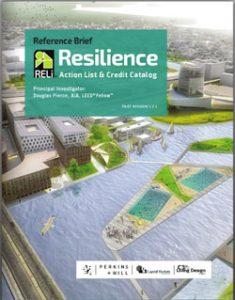RELi, the U.S. Green Building Council’s new standard for projects designed to endure and recover from extreme weather, is a national consensus standard. It was developed through an American National Standards Institute (ANSI) process, and focuses on creating resilient buildings and communities.
 RELi (pronounced ‘rely’) is a comprehensive response to the urgent need for resilience in design and planning. Maintaining a reasonable level of safety and quality in our day-to-day lives now requires that we collectively respond to weather extremes, economic disruptions, and resource depletions — all of which are becoming commonplace globally, regionally, and locally. Resilience involves interactive social, economic, and environmental elements that respond to both acute short-term and systemic long-term topics related to the well-being of our society and planet.
RELi (pronounced ‘rely’) is a comprehensive response to the urgent need for resilience in design and planning. Maintaining a reasonable level of safety and quality in our day-to-day lives now requires that we collectively respond to weather extremes, economic disruptions, and resource depletions — all of which are becoming commonplace globally, regionally, and locally. Resilience involves interactive social, economic, and environmental elements that respond to both acute short-term and systemic long-term topics related to the well-being of our society and planet.
USGBC and GBCI have now adopted the RELI standard. GBCI and the RELi resilience standard will work together to develop buildings and communities that offer greater adaptability and resilience to weather and natural disasters.
RELi’s development was led foundationally by the global architecture firm of Perkins+Will, with Eaton Corporation, Deloitte Consulting, and Impact Infrastructure providing vital content expertise and critical assessment.
For more information on RELi, click here to view the RELi handbook online, or click here for information on a Resiliency Education Series event featuring Dan Slone.




